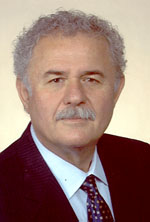Molecular oncology pioneer dies at age 64
 Takis
S. Papas, Ph.D., director of the Center for Molecular and Structural
Biology (CMSB) at the Hollings Cancer Center and MUSC professor of medicine
since 1993, died Friday, Nov. 19. He was 64.
Takis
S. Papas, Ph.D., director of the Center for Molecular and Structural
Biology (CMSB) at the Hollings Cancer Center and MUSC professor of medicine
since 1993, died Friday, Nov. 19. He was 64.
Dr. Papas led a group of scientists and physicians whose mission is to conduct research that will result in new and potent anti-cancer therapies.
As a cancer researcher, Dr. Papas was internationally recognized as an outstanding scientific leader and among the founders of the field of molecular oncology. He was one of the first scientists credited with the discovery of cancer-causing oncogenes. Central to this discovery was the demonstration that when critical normal genes in the cell called proto-oncogenes suffer mutations, they are transformed into oncogenes.
His scientific career spanned more than a quarter century, most of which was at the National Institutes of Health and at the National Cancer Institute (NCI). While at the NCI, he became the chief of the Laboratory of Molecular Oncology, where he headed a group of more than 90 research scientists involved in studies of the genetic basis of cancer.
Dr. Papas authored more than 320 research publications as well as several books. He also earned several patents. He organized and led numerous scientific meetings, both in the United States and internationally and served as an editor or associate editor on more than 10 leading scientific journals. He was among the most sought-after lecturers in his field.
Dr. Papas held academic positions as a professor of biology at Johns Hopkins University from 1984-1993 and as adjunct professor of biochemistry at Georgetown University School of Medicine.
Dr. Papas received numerous honors and awards and was the recipient of the prestigious NIH Award of Merit in 1983 for his contributions that have led to the understanding of oncogenes. Recently, Dr. Papas had received an honorary degree in medicine (Graudos De Doctor Honoris Causa), Universita Autonoma De Neuvo Leon, Monterey, Mexico.
Dr. Papas provided advisory and academic support for research institutions in such diverse locations as Kuala Lampur, Crete, Shanghai and Mexico. He was a member of the scientific advisory board of the Roosevelt Foundation in Denver, Colo., The Institute for Human Virology in Baltimore, Md., and the Human Neurovirology Center at Allegheny University in Philadelphia, Pa. Dr. Papas trained more than 200 scientists who occupy key positions in academic and industrial laboratories throughout the world.
Dr. Papas was attracted to the Medical University of South Carolina by President James B. Edwards, DMD, together with Sen. Ernest F. Hollings, both strong proponents of cancer research.
At MUSC, Dr. Papas and his team had been successful in attracting top scientific talent and research funding to work on a variety of cancers. These include cancers of the prostate and pancreas that affect a disproportionately large number of people in South Carolina, especially minority and underserved populations in the Lowcountry.
Since its founding in 1993, the Center for Molecular and Structural Biology has grown to more than 50 researchers with an annual budget approaching $4 million. Dr. Papas and his team had discovered several new genes that play important roles in the cancer process. His group has also created specialized mouse strains with altered genes using state-of-the-art “gene knockout” and “transgenic” technologies that allow more precise study of the ways altered genes cause cancer. Together with modern biotechnology, Dr. Papas created a scientific center poised to develop the molecular medicines of the 21st century.
Dr. Papas was born in Kalmata, Greece, a son of Stavros Papadopoulos and Demetra Arvenitou Papadopoulos. He was a graduate of the University of New Hampshire and Marquette University in Milwaukee, where he received a Ph.D. He was a member of numerous scientific organizations in the United States and was a member of Holy Trinity Greek Orthodox Church in Charleston.
Surviving are his wife, Tula Christy Papas; two daughters, Katie Papas of Rochester, N.Y., and Laura Papas of Boulder, Colo.; a brother, John Papas of Dover, N.H.; and a sister, Koula Maragoudakis of Athens, Greece.